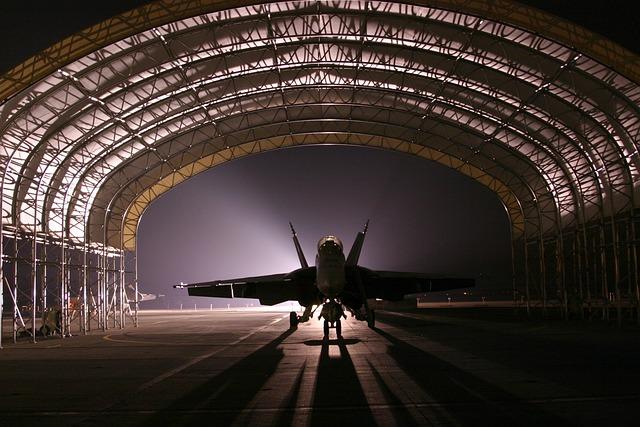in a meaningful strategic realignment, France has commenced the transfer of its military bases in Senegal as part of a broader withdrawal initiative from its historical military foothold in West Africa. This move not only underscores France’s evolving role in regional security dynamics but also reflects the shifting geopolitical landscape marked by an emphasis on sovereignty and self-determination among African nations. As part of its ongoing efforts to adapt to changing security needs and local sentiments, France aims to enhance its partnership with Senegal while gradually ceding direct military oversight. This article delves into the implications of this transfer for both nations, exploring the historical context, current military cooperation, and future prospects in a rapidly transforming security environment.
France’s Strategic Shift: Understanding the Withdrawal from Military Bases in Senegal
The recent declaration regarding the withdrawal of French military bases in Senegal marks a significant turning point in France’s foreign military policy in Africa. This strategic shift underscores a growing trend of re-evaluating military presence on the continent, reflecting broader geopolitical dynamics and the evolving security landscape. Acknowledging Senegal’s increasing capacity to manage its own security needs, France aims to strengthen its diplomatic ties while fostering local autonomy. The withdrawal serves several purposes, including:
- Enhancing Senegal’s Sovereignty: By transitioning control, France promotes Senegal’s independence in defense matters.
- Adapting to Regional Threats: This move allows France to reallocate resources to regions experiencing heightened instability.
- Rebuilding Trust: Easing its military footprint may help alleviate anti-French sentiments prevalent among some segments of the Senegalese population.
Additionally, the transfer will not be an immediate abandonment of presence but rather a gradual handover that includes increased collaboration on security and anti-terrorism measures. Key elements of this transition are set to include joint training exercises and intelligence sharing, ensuring that Senegal can continue to effectively address regional security challenges. The following table highlights the timeline and major milestones associated with this withdrawal:
| Milestone | date | Description |
|---|---|---|
| Initial Announcement | Q1 2024 | France officially announces the withdrawal of its military bases. |
| Strategic Review | Q2 2024 | Joint assessments of Senegal’s military capabilities performed. |
| Training Initiatives | Q3 2024 | Implementation of joint training exercises begins. |
| Completion of Withdrawal | Q1 2025 | Full transfer of base control to Senegalese forces. |

Historical Context of French Military Presence in Africa
The dates back to the colonial era, when France established a significant foothold across the continent. This military involvement was rooted in a broader strategy of maintaining control over their colonies and securing economic interests. Following decolonization in the mid-20th century, France transitioned from outright colonial governance to a policy of “Françafrique,” wherein it maintained extensive political, economic, and military relationships with its former colonies. Consequently, several military bases were established across key African nations, serving both as deterrents against regional conflicts and as hubs for international security operations.
Key factors defining this historical relationship include:
- Colonial Legacy: The deep-seated ties from the colonial period influence current military agreements.
- Security Partnerships: Ongoing cooperation to combat terrorism and stabilize regions prone to instability.
- Military Aid: Provision of training, equipment, and logistical support to local forces.
- Political Influence: Ensuring the political alignment of african nations with French interests.
As France prepares to withdraw and transfer military bases to Senegal, it highlights a shift in strategy reflecting contemporary geopolitical dynamics. The decision underscores a need to adapt to changing perceptions of colonial legacies and the desire for greater African self-determination. Notably, France’s military presence has recently faced criticism for being a symbol of neocolonialism, with local populations increasingly advocating for sovereignty and reduced foreign influence. This transitional moment is crucial as it signifies France’s commitment to redefining its role in Africa—a pivot from military imperialism to a more nuanced, cooperative approach based on mutual interest and respect.
Factors influencing this transition include:
| Factor | Description |
|---|---|
| Local sentiment | Increased calls for national autonomy among African populations. |
| Geopolitical Changes | Shifts in global power dynamics and regional alliances. |
| International Relations | Pressure from other nations urging for non-interventionist policies. |
| Economic Considerations | Focus on fostering economic partnerships rather than military presence. |

Implications for Regional Security: What This Means for Senegal and West Africa
the recent decision by France to transfer its military bases in Senegal marks a significant shift in the security landscape of West Africa. This move is indicative of a broader trend as European powers reassess their military presence on the continent. As France steps back, regional powers like Senegal are likely to face increased pressure to enhance their own military capabilities and security frameworks. The implications for regional security could include:
- Increased Autonomy: Senegal may gain more control over its security operations,allowing for tailored responses to local threats.
- Regional Cooperation: This transition could lead to strengthened alliances among West African nations, fostering collaborative security initiatives.
- Rise of Local Insurgencies: A power vacuum created by the withdrawal might embolden extremist groups or local insurgents in surrounding areas.
- Shifting Alliances: Countries may seek new partnerships with other global powers, altering the traditional geopolitical dynamics in West Africa.
Furthermore, this shift poses a challenging dilemma for policymakers in Senegal and neighboring countries. With France’s withdrawal,there is an urgent need to address potential security gaps and ensure stability in a historically volatile region. The transition may further necessitate:
- Investment in Military Infrastructure: Strengthening local armed forces through training and resources will be imperative.
- Intelligence Sharing: Governments may need to enhance information exchange to combat rising threats collaboratively.
- Socio-Economic Advancement: Addressing underlying issues such as poverty and unemployment could mitigate the allure of extremist ideologies.
| Key Factors | Potential Outcomes |
|---|---|
| Withdrawal of french troops | increased local military obligation |
| Increased regional cooperation | Enhanced collective security measures |
| Power vacuum in security | Potential rise in extremist activities |
| International partnerships | Realignment of foreign alliances |

Analyzing the Impact on Bilateral Relations between France and Senegal
The recent decision by France to transfer military bases to Senegal marks a significant pivot in bilateral relations between the two nations. This move can be interpreted as both a recognition of Senegal’s growing regional influence and a strategic adjustment by France to consolidate its military presence in West africa. The transfer is likely to enhance military cooperation, allowing for joint training exercises and operational coordination against rising security threats in the Sahel region. As France continues to grapple with its role in African security, Senegal’s position as a partner will be redefined, fostering deeper ties beyond just military collaboration.
Furthermore, the transfer is expected to have broad implications for diplomatic relations and economic cooperation. By establishing a more permanent French military presence in Senegal, France can bolster defense infrastructure, perhaps attracting new investments in the defense sector. This shift could lead to increased trade opportunities and strengthen Senegal’s diplomatic standing, reflecting its pivotal role in maintaining regional stability. In addition, the engagement may pave the way for cultural exchanges and educational initiatives, as both nations seek to consolidate their partnership in various arenas.

Recommendations for Strengthening Senegal’s Defense Capabilities Post-Withdrawal
As Senegal prepares for a new chapter in its defense landscape following the withdrawal of French military bases, it becomes critical to explore innovative strategies to enhance national security capabilities. The goverment should consider the following initiatives:
- Investment in Technology: Embrace modern warfare technologies, including unmanned aerial vehicles (UAVs) and cyber defense systems, to bolster surveillance and intelligence capabilities.
- Regional Cooperation: Strengthen collaboration with neighboring West African countries through joint military exercises and intelligence sharing to build a more formidable regional defense network.
- Local Defense Industry Development: Promote the establishment of a domestic defense sector that can manufacture equipment and supplies. This not only boosts the economy but also reduces dependency on foreign military resources.
- Training Programs: Expand training and professional development programs for military personnel, both within Senegal and through partnerships with established military institutions globally.
Moreover, to ensure a robust response mechanism to evolving security threats, Senegal should prioritize the following structural adaptations:
| Action item | Expected Outcome |
|---|---|
| Establish a National Security Council | Enhance strategic coordination across different sectors of security. |
| Create Rapid Reaction forces | Enable swift responses to emerging threats and humanitarian crises. |
| Engage Civil Society | Foster a collaborative approach to security that includes community involvement. |

Future Prospects: Lessons Learned and the Path Forward for France-Africa Military Cooperation
The recent transfer of military bases from France to Senegal marks a pivotal moment in France-Africa military relations, shedding light on the evolution of international cooperation frameworks in the region. This strategic withdrawal emphasizes a shifting paradigm where African nations increasingly assume responsibility for their security and defense. As France repositions its military assets, it opens the door for new partnerships and redefined roles for African countries, which can leverage their local knowledge and capabilities to address regional threats. Key lessons from this transition include:
- Empowered Sovereignty: African nations are becoming more assertive in shaping their security policies.
- Collaborative Security Frameworks: Enhanced joint operations and training exercises can foster stronger collaborative ties.
- Capacity Building: Investment in local forces leads to more sustainable and effective defense strategies.
Looking forward, future collaboration will likely hinge on establishing equitable partnerships that prioritize African expertise and leadership.The transition must not only involve resource and intelligence sharing but also address socio-political dynamics that influence stability in the region. As the lessons learned from this withdrawal take root, essential initiatives should include:
| Initiatives | Description |
|---|---|
| Joint Training Programs | Enhancing skills and interoperability between forces. |
| Intelligence Sharing | Facilitating real-time data exchange for improved response strategies. |
| Infrastructure Support | Investing in modern military infrastructure and logistics. |
In Retrospect
France’s decision to transfer military bases to Senegal marks a significant shift in its military strategy in West Africa. This withdrawal not only reflects France’s evolving relationship with its former colonies but also highlights Senegal’s growing role as a stabilizing force in the region. As security dynamics continue to change amid rising challenges such as terrorism and regional conflicts, the implications of this transfer will be closely monitored by both local and international observers. The future of military cooperation between france and Senegal will be crucial in determining the effectiveness of regional security initiatives and the broader impact on west African geopolitics. As both nations navigate this transition, the focus will remain on strengthening partnerships that prioritize peace and stability in a rapidly changing landscape.







